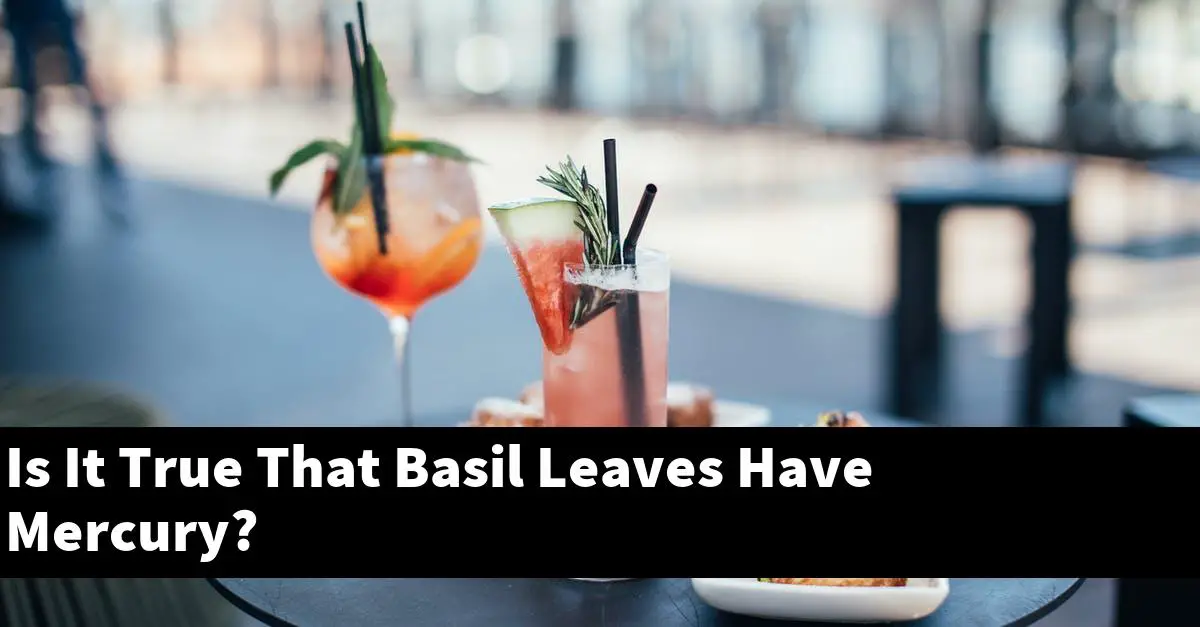Basil leaves are a common ingredient in many cuisines, but there is some debate over whether or not they contain mercury. Some studies have found trace amounts of mercury in basil leaves, while others have not.
It is not clear if the mercury present in basil leaves is harmful to humans, but more research is needed to determine the potential risks.
How much mercury is too much?
Mercury levels can vary greatly depending on a person’s occupation, diet and other personal factors. However, the National Institute for Occupational Safety and Health (NIOSH) recommends that workers who are exposed to mercury levels of 10 micrograms or more per cubic meter of air (10 ppm) for an extended period of time, or who have a history of mercury exposure, should take special precautions to avoid further exposure.
What is tulsi?
Tulsi, also known as Holy Basil, is a herbaceous perennial plant that is native to the Indian subcontinent and Southeast Asia. The name tulsi is derived from the Sanskrit word tulasī, meaning “fragrant” or “peppery.
” Tulsi is most commonly used in Ayurvedic medicine as a digestive aid and to improve respiratory health.
Is it ok to eat fresh basil leaves?
There is no definite answer to this question as it depends on individual preferences. Some people may enjoy the taste of basil leaves while others may not.
There is no harm in eating fresh basil leaves, as long as they are properly washed and dried.
Can basil leaves be toxic?
Basil leaves can be toxic if ingested in large quantities. The leaves can cause gastrointestinal issues including nausea, vomiting, and diarrhea.
In extreme cases, basil leaves can cause liver failure.
Does basil have mercury in it?
Basil is a herb that is used for flavoring and for its medicinal properties. One of basil’s medicinal properties is that it can help to reduce mercury levels in the body.
Basil does not contain any mercury, and it is not a source of mercury for the body.
What is wrong with my basil plant?
There could be a number of reasons why your basil plant is not doing well. First, it may be that the plant is not getting enough water.
Make sure that the soil is moist, but not soggy. Second, basil plants can be sensitive to a wide variety of environmental factors, including excessive sunlight, cold temperatures, or dry air.
Finally, basil plants may be losing leaves or flowers. If you notice any of these problems, take steps to correct them.
Who should avoid basil?
Basil is not recommended for people with certain health conditions, as it can cause irritation. It is generally safe to consume, but people with respiratory problems or asthma should avoid it because of the high concentration of basil oil in the plant.
What are the medicinal properties of basil?
Basil is a member of the mint family and has been used as a medicinal herb for centuries. Basil is thought to have a variety of medicinal properties, including anti-inflammatory, antimicrobial, and antispasmodic effects.
Basil is also thought to be effective in treating conditions such as colds, bronchitis, and sinusitis.
Why do plants have mercury in their leaves?
Mercury is a heavy metal that is found in the earth’s crust. It is also found in the atmosphere and in the water we drink.
Mercury can be found in both living and nonliving things.
Mercury can be found in plants because it is a component of the earth’s crust. Mercury is found in the soil, water, and air.
It can also be found in plants because it is absorbed from the air and water.
When mercury is absorbed from the air and water, it can be found in the leaves, flowers, and roots of plants. Mercury is a heavy metal, so it can be deposited in the leaves and other parts of the plant.
Mercury can also be released from the leaves and other parts of the plant.
What happens if we eat tulsi leaves daily?
If one consumes a daily dose of tulsi leaves, it is purported to improve general health by promoting better digestion, providing relief from indigestion and gas, and aiding in weight loss. Additionally, the leaves are said to be helpful in countering stress, anxiety, and depression.
In Summary
There is no evidence to support the claim that basil leaves have mercury. Mercury is a heavy metal that is not found in plants.
The claim may have come from the fact that some countries use mercury to fumigate basil crops, but the mercury does not remain in the leaves.

